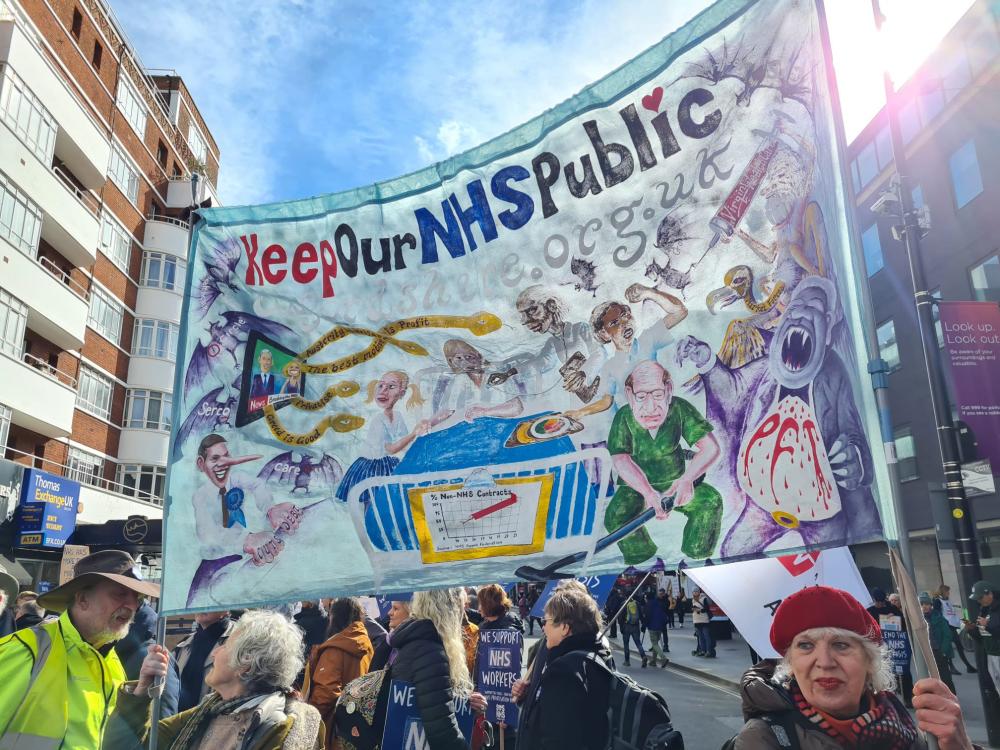April 7, 2023 - No. 19
European Workers' Mass Opposition to Anti-Social Offensive
Clash in France over Pension Reform
Goes to Heart of Crisis of Liberal
Democratic Institutions
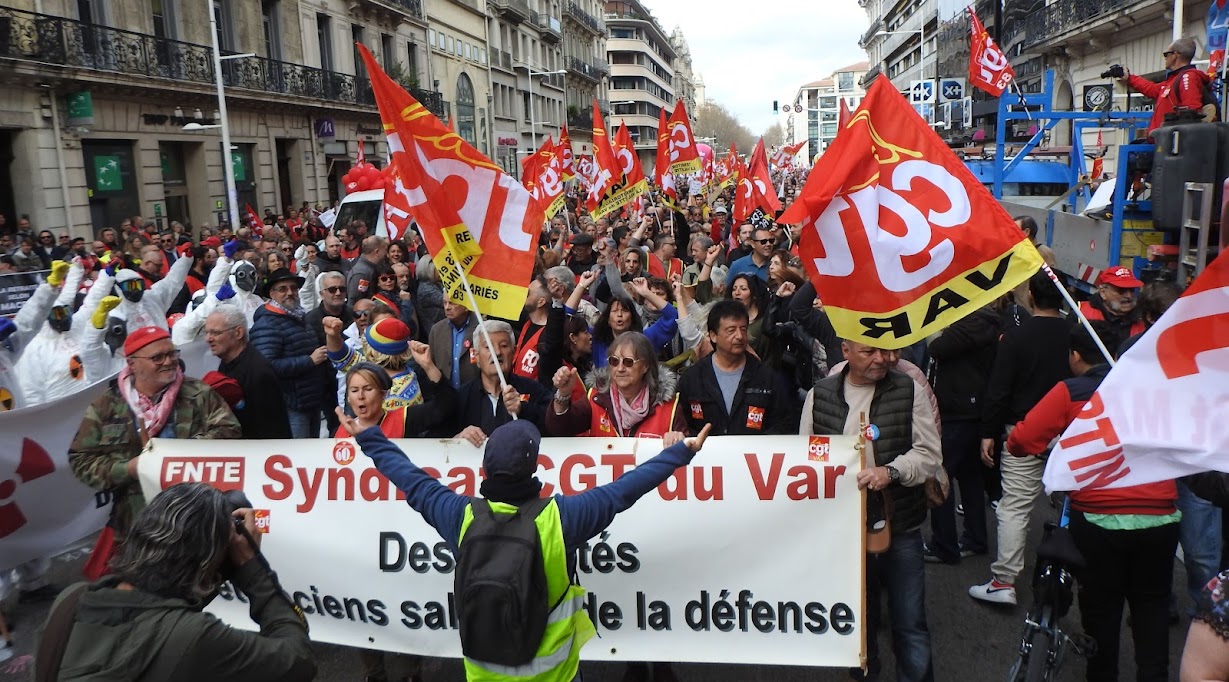 Toulouse, France, March 23, 2023
Toulouse, France, March 23, 2023
• German Workers Hold Mass Strikes Against Untenable Living and Working Conditions
• Wave of Strikes Across Britain Marks Pay-the-Rich Budget Day
India
• Farmers Continue Mass Meetings and Organizing
European Workers' Mass Opposition to Anti-Social Offensive
Clash in France over Pension Reform Goes to Heart of Crisis of Liberal Democratic Institutions
 Paris, March 23, 2023
Paris, March 23, 2023
Mass protests have been underway in France from January 19 to the present in opposition to anti-social pension reforms of the government of President Emmanuel Macron. Hundreds of demonstrations have taken place during that time, with as many as 3.5 million people taking part across the country on March 23 alone. The extent of the actions has been called historic in the last 40 or 50 years in terms of numbers of people participating.
 In
the
face of this broad and sustained action by the people, the Macron
government used special powers to force through its pension reform,
that will raise retirement age from 62 to 64. On March 16, unable to
negotiate enough votes to guarantee passage of the bill through the
National Assembly, Macron sought recourse to Article 49:3 of the French
Constitution, that allows governments to bypass the legislature and
force through bills without a vote. These powers were enshrined in the
constitution during the presidency of Charles de Gaulle, in the name of
guaranteeing "political stability." Such use of the constitution exposed
the government to two non-confidence votes, both of which Macron
managed to survive, thus putting the deputies forced to vote with him in
jeopardy of not being re-elected, showing how things unravel and go
from bad to worse.
In
the
face of this broad and sustained action by the people, the Macron
government used special powers to force through its pension reform,
that will raise retirement age from 62 to 64. On March 16, unable to
negotiate enough votes to guarantee passage of the bill through the
National Assembly, Macron sought recourse to Article 49:3 of the French
Constitution, that allows governments to bypass the legislature and
force through bills without a vote. These powers were enshrined in the
constitution during the presidency of Charles de Gaulle, in the name of
guaranteeing "political stability." Such use of the constitution exposed
the government to two non-confidence votes, both of which Macron
managed to survive, thus putting the deputies forced to vote with him in
jeopardy of not being re-elected, showing how things unravel and go
from bad to worse.
"By resorting to [Article] 49.3 the government demonstrates that it does not have a majority to approve the two-year postponement of the legal retirement age," Laurent Berger, Secretary General of the Confédération française démocratique du travail (CFDT) union central said on Twitter. "The political compromise failed. Workers must be listened to when it is their work being acted upon."
The unfolding situation in France reveals above all else the crisis in which what are called liberal democratic institutions are mired. It is not the people who set agenda and decide on the matters of concern to them, but an elite which has usurped the decision-making power. Changing the age of retirement will not solve the problems the French economy faces and taking measures which favour the rich and turn the working people of France into things which are disposable on a ledger sheet will definitely exacerbate them.

Slogan painted on wall in
Paris
Amidst these protests, King Charles III attempted to make his
first
trip abroad with a visit to France from March 22 to 26. French workers
gave a fitting response, and showed that they are in no mood for
retrogression and symbols of anachronistic forms of governance that
they brought to a
decisive end more than 200 years ago. In Bordeaux, to be the King's
first stop in France as an allegedly symbolic repetition of the
itinerary of Elizabeth II to France after her coronation, mass protests
stopped this in its tracks. In a move which makes one really wonder
what world the ruling class lives in, the reception was moved to
Versailles but the workers would have none of it. Train and bus lines
were cut to Versailles, utility workers cut off the gas and electricity
supply to Versailles and the workers from the protocol department of
the French government refused to lay out a red carpet. The French
workers to their credit and honour thus managed to cancel the visit; a
fitting beginning for the ill-fated reign of this relic of history on
the eve of his coronation.
Actions Across
France March 23

Paris
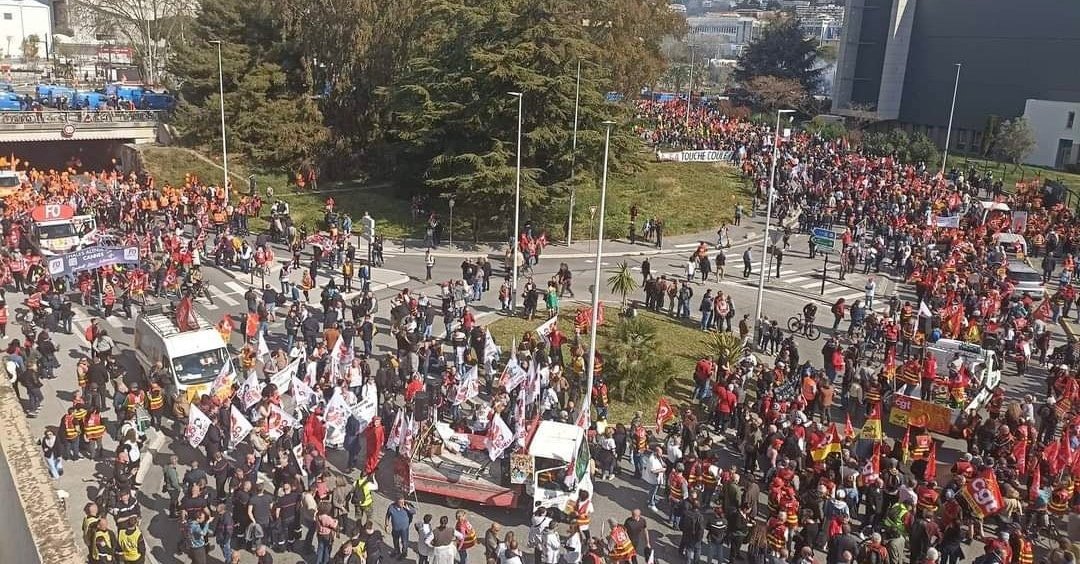 Nice
Nice

Niort
 Saint Quentin
Saint Quentin
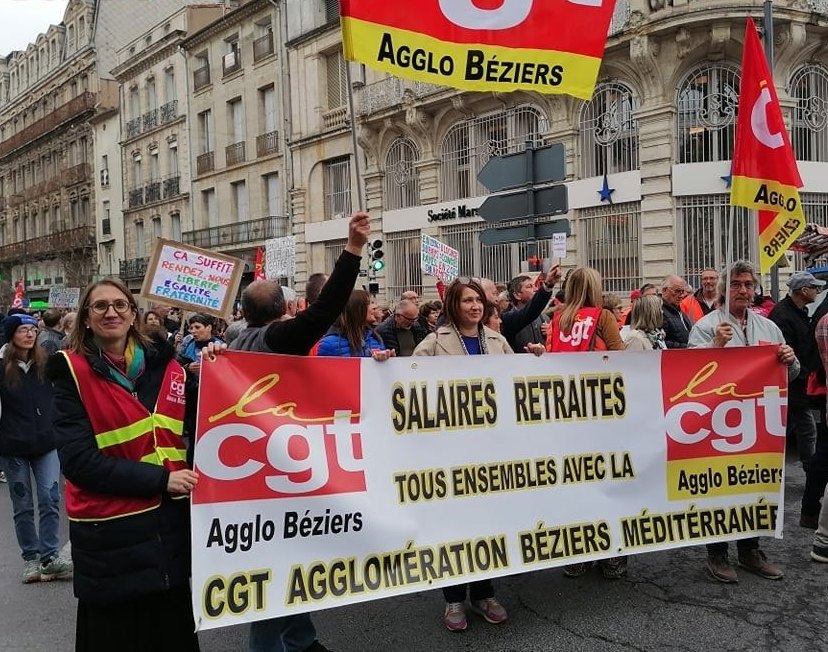
 Bézier
Bézier

 Albi
Albi
(Photos: CGT)
German Workers Hold Mass Strikes Against Untenable Living and Working Conditions
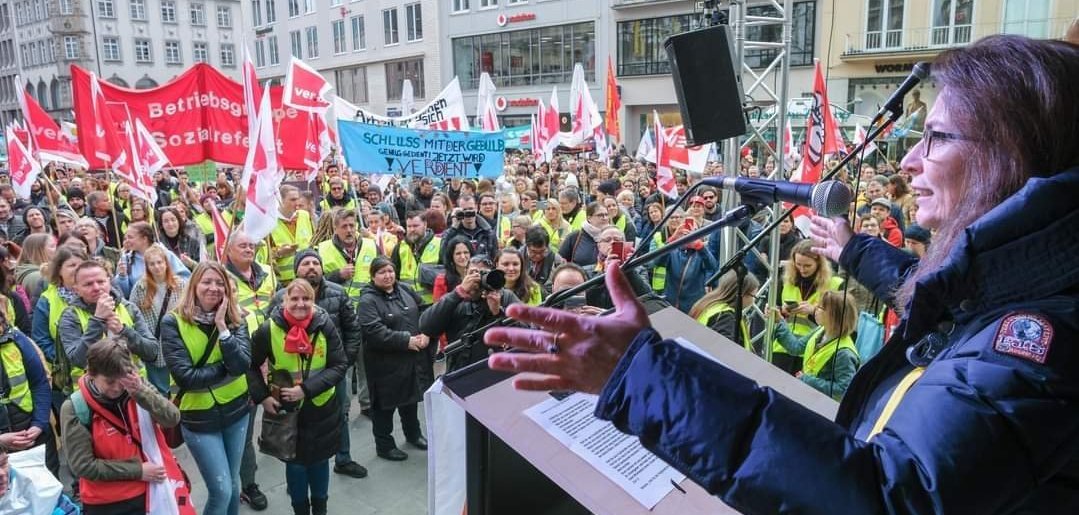
Public sector strike
March 22, 2023
Throughout March, German workers have been in action to demand living and working conditions they require to provide public services and carry out production in their sectors. Inflation in Germany is said to be at 10.4 per cent, however, at the last negotiations with public sector employees on February 23, the government offered only a five per cent wage increase.
In the public sector, which counts 2.5 million civil servants and municipal employees, the union Verdi is demanding a 10.5 per cent increase as well as a minimum monthly increase of 500 for the lowest salaries. It is also demanding a pay increase of 200 per month for trainees, students and interns and that apprentices be offered permanent employment after successfully completing their training.
The EVG union, which is negotiating for around 180,000 employees at the national railway Deutsche Bahn, is demanding 12 per cent more pay, or at least 650 more a month. For junior staff, it is asking for at least 325 more per month for a period of twelve months.
Industrial union IG Metall, is demanding an eight per cent pay increase, or at least 200 more per month for the workers it represents.
On March 3, workers providing local public transportation went on strike, in coordination the youth climate activists of Fridays for Future.
On March 8, International Women's Day, childcare workers in nurseries, kindergartens and social services stopped work across the country. Municipal workers who provide garbage collection, forestry workers, security guards in airports and cultural workers all went on strike in March.
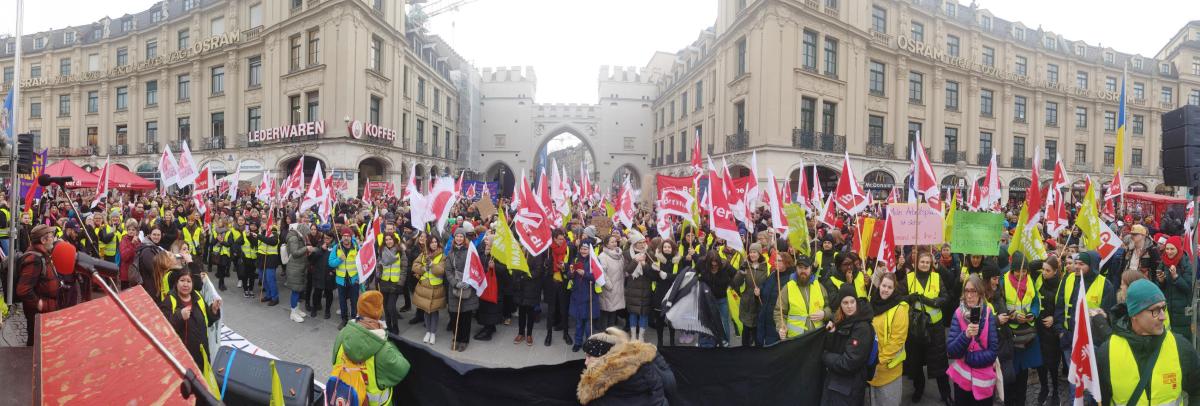
Child care workers' strike
March 8, 2023.
On March 9, industrial workers organized in the IGBCE trade union held a day of action, calling for improvements to workplace safety and a lower industrial electricity rate.


Day of action for
workplace safety and reductions in rate for electricity for industry,
March 9, 2023
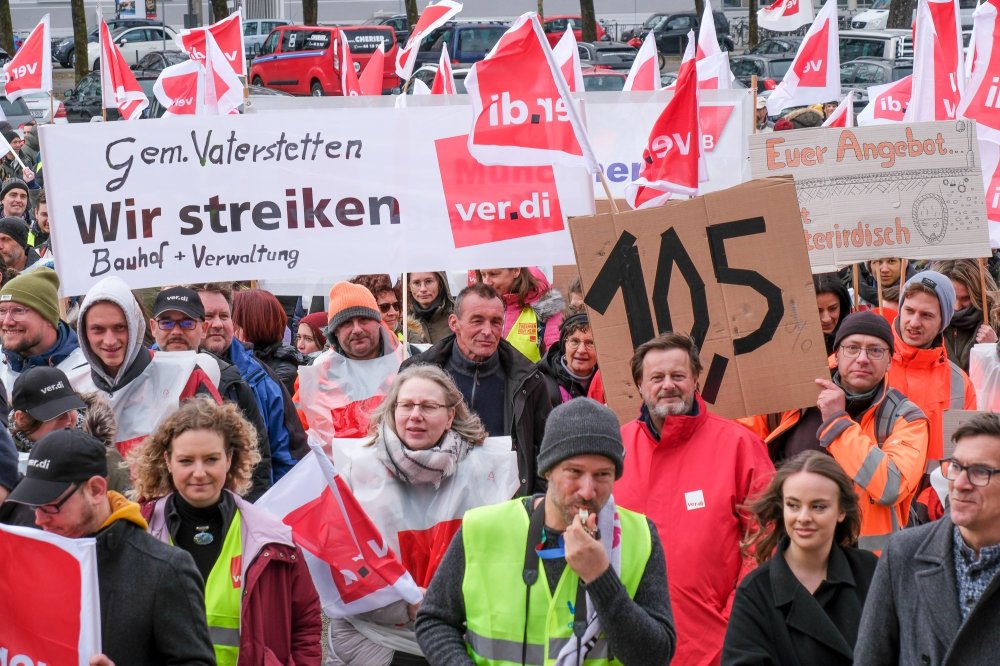
 Public sector
workers' strike March 9, 2023
Public sector
workers' strike March 9, 2023
The 160,000 postal workers who had voted 86 per cent in favour of taking indefinite strike action in early March, in support of a 15 per cent wage increase to counter inflation, settled a new two-year contract with Deutsche Post on March 11, achieving wage increases from 11 to 20 per cent. Postal workers had held several walkouts in January and February to press their demands.
On March 27, tens of thousands of workers in the transportation sector held a one-day "warning strike," shutting down travel by rail and air. Nearly 400,000 air travellers across Europe had their flights cancelled. Local transportation, including subways, ferries and buses also did not run. The last time joint strike actions were held across local, national and air transportation sectors was 30 years ago.

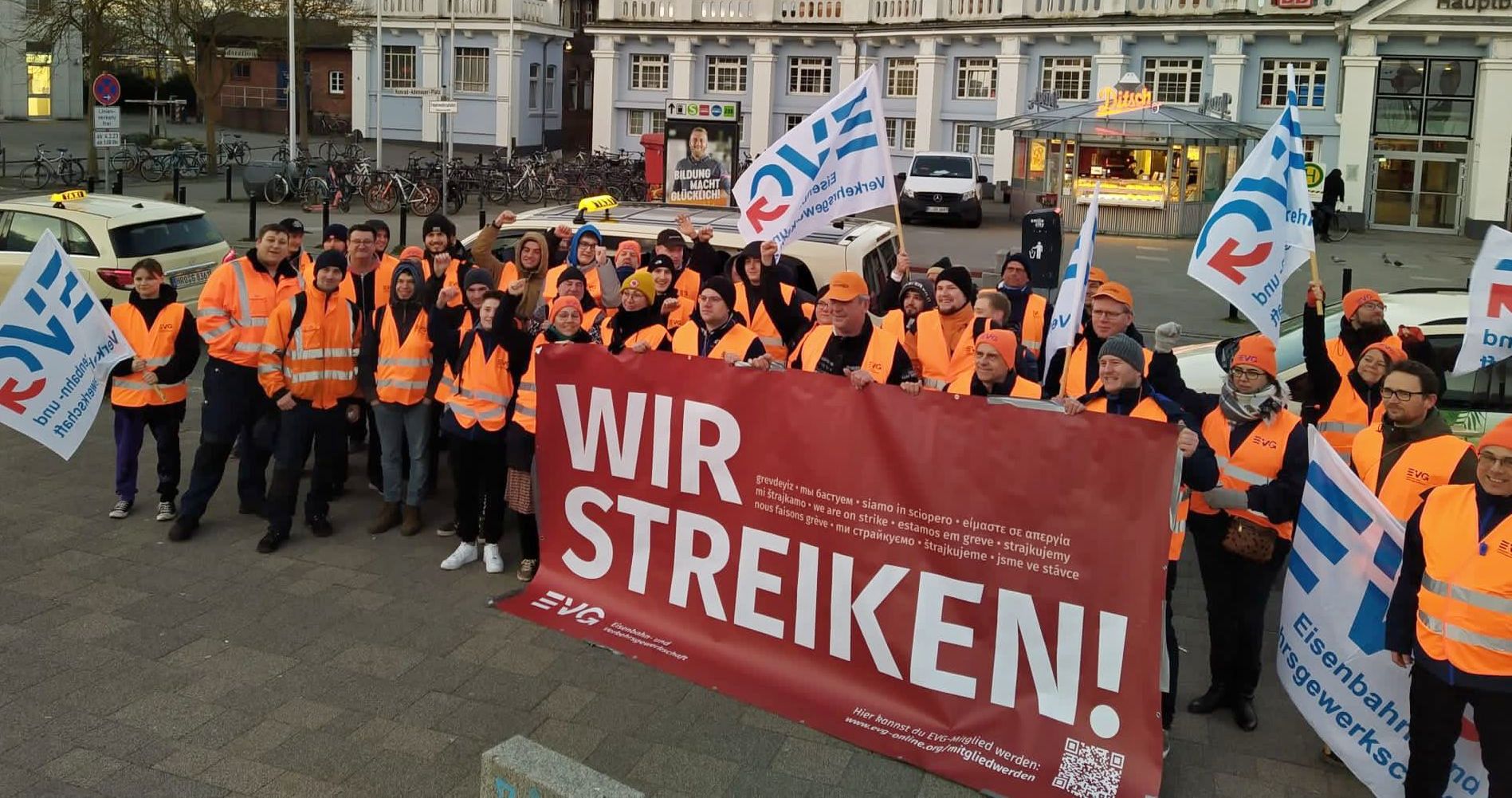
 Railway workers' strike.
Railway workers' strike.
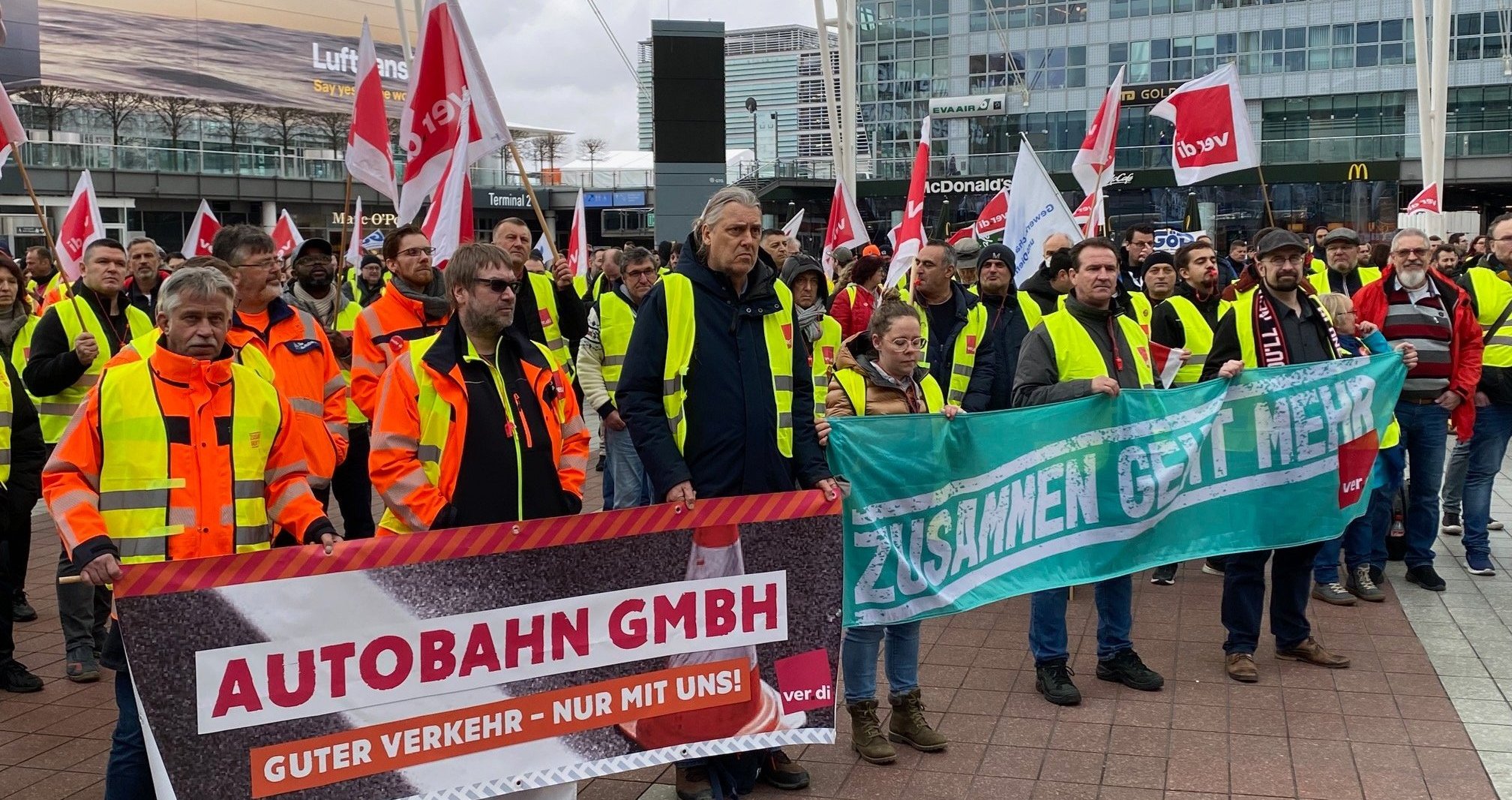 Airport workers' strike.
Airport workers' strike.
The government says the workers' demands are "unreasonable." However, the German workers are well aware of their contributions to the society and economy and are sticking to their demands. They are also encouraged by the stands being taken by their counterparts in France, the UK and Greece.
A report from Deutsche Welle, like many others, glibly attributes the "soaring fuel, energy and food prices" German workers are facing "partly [to] Russia's invasion of Ukraine," as if such a situation was unavoidable. Instead, the ruling circles of Germany continue to throw in their lot with the U.S./NATO proxy war in Ukraine, to the detriment of all the peoples of Europe. Speaking in the Bundestag on March 2, German Chancellor Olaf Scholz said he was in talks with the armaments industry to increase production of military equipment for both the German and other European armies. Later in the month, Eva Högl, commissioner for Germany's armed forces, said the build-up of the military was "too sluggish" and that the special 100 billion euro fund to address its deficiencies should be increased to 300 billion euros.
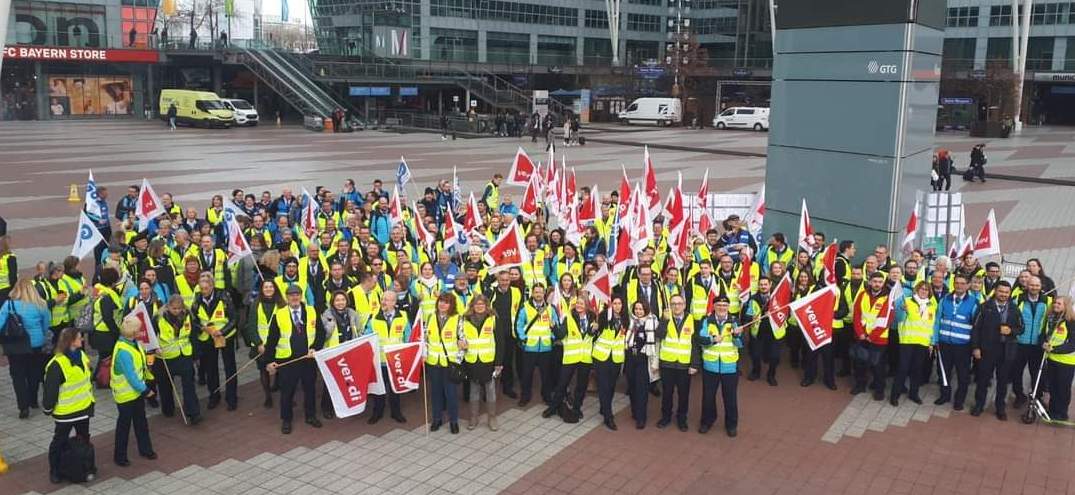 Airport security workers' strike
March 10, 2023.
Airport security workers' strike
March 10, 2023.
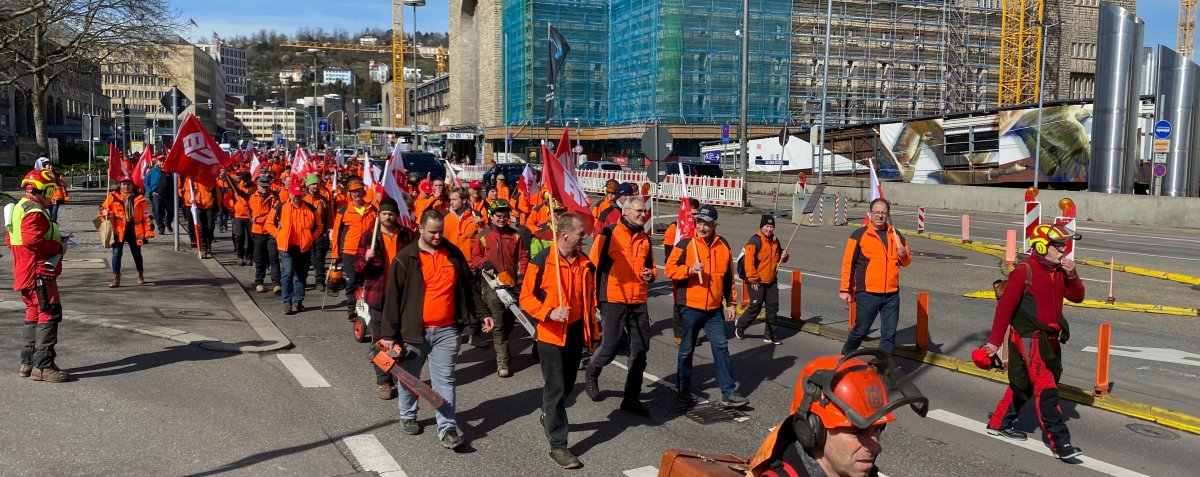
Forestry workers' strike,
March 16, 2023.
(Photos: Ver.di, IGBCE, EVG)
Wave of Strikes Across Britain Marks
Pay-the-Rich
Budget Day
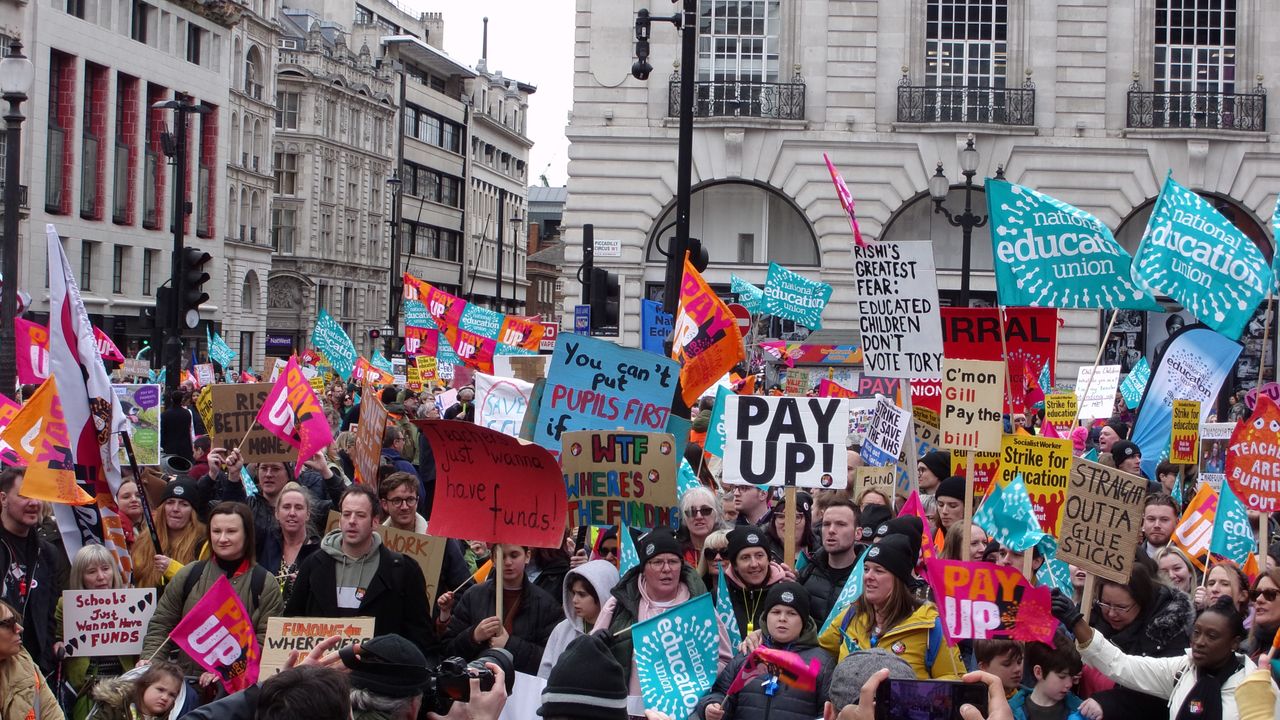 At least 40,000 strikers march
through central London to a rally in Trafalgar Square on March 15, 2023.
At least 40,000 strikers march
through central London to a rally in Trafalgar Square on March 15, 2023.
Mass strike actions throughout Britain that gained momentum in February have continued into March, peaking around the day of the Spring Budget on March 15. An estimated 400,000 to half a million people across various sectors of the socialized economy struck work together on that day alone. The budget was notable in how it did nothing to meet the demands of the workers, their unions and all those who rely on services the workers provide. Mass strikes are likely to continue in April.
Teachers' Strike
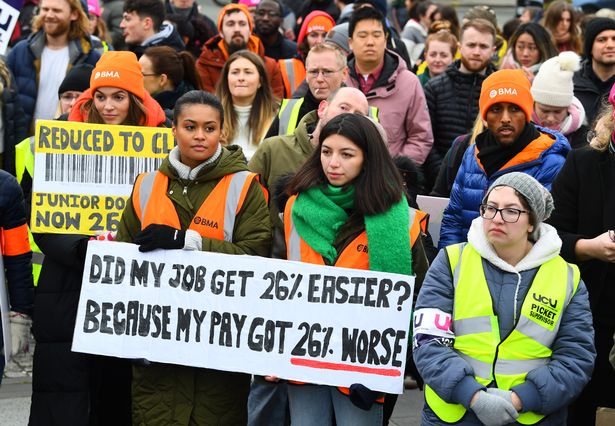 Rally outside Liverpool's
Metropolitan Cathedral including junior doctors, teachers and civil
servants, March 15, 2023.
Rally outside Liverpool's
Metropolitan Cathedral including junior doctors, teachers and civil
servants, March 15, 2023.
Over 100,000 teachers struck work March 15 and 16, continuing their biggest period of strike action in 30 years, affecting the vast majority of schools across the country. The National Education Union (NEU) is demanding a fully-funded pay increase due to rising inflation and 10 years' worth of real-term pay cuts. Since 2010, pay has fallen 23 per cent in real terms. The NEU informs that other issues that cause "disruption and long-term damage to education every day" include rising class sizes, support for special educational needs, recruitment and retention of staff, disrepair of facilities and excessive workload. Workers' Weekly explains, "The struggle for a properly funded and modern education system has been ongoing for many years, with teachers questioning the future of education that is being unsustainably underfunded and undermined. Their actions have exposed for all to see that the very future of education is at stake. Forms must be found to empower them to discuss and provide the solutions themselves."
The NEU points out that the Government of England is unsettled by the teachers' support for strike action, the influx of new members to the union and the degree of parental support, and has taken the "very new and unusual" step of demanding that the strikes be cancelled before it makes a first offer on pay and funding.
Workers' Weekly adds, "The crisis has developed to a point where the block to discussing the future of education must be overcome, with teachers themselves at the forefront of this discussion. It is noteworthy then that teachers have forced progress in Wales and Scotland, where such preconditions were not declared, serious offers have been made, and strike action has been postponed or ended."
University Staff Strike
 Strike actions and protests across
York.
Strike actions and protests across
York.
University staff went on strike from March 15 to 23, involving 70,000 staff at 150 universities across Britain, including academics, librarians, and other staff. While this completed the 18 days of planned action in February and March, the University and College Union (UCU) is seeking a mandate from its members to extend strike actions to the end of the academic year. The struggle has been marked by employers' imposition and refusal to negotiate, with UCU members rejecting the latest offer of around five per cent. The strike actions, which affect some 2.5 million students, have been backed by the National Union of Students.
University staff have experienced what amounts to 10 years of wage cuts due to inflation, an average of two days unpaid work per week, while a third of academic staff are on temporary contracts. University staff want wage increases that address the inflation crisis, an end to insecure contracts and that severe workloads be addressed. They also want cuts made to pensions and benefits restored. The pension cuts made last year will see the average member lose 35 per cent of their guaranteed future retirement income. For those early in their careers, the losses amount to hundreds of thousands of pounds.
Workers' Weekly highlights the important role played by university staff, saying, "Higher education workers add huge value to the economy, and contribute to culture and society by producing highly skilled graduates and postgraduates, and carry out research that leads to scientific and technological advances. Education is a right and should serve society. In struggling for their rights and claims, academics and higher education workers, as well as school teachers, are fighting for the rights of all."
Junior Doctors' Strike
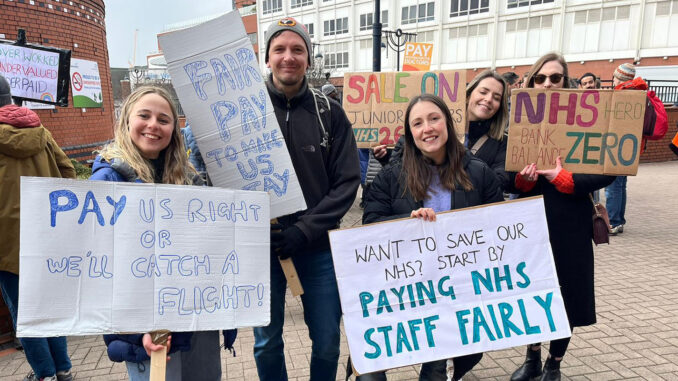 Junior doctors' picket in Leeds.
Junior doctors' picket in Leeds.
Junior doctors in England held a virtually unprecedented 72-hour strike from March 13 to 15. The strike was mandated by a 98 per cent vote in favour of action with 77 per cent of junior doctors taking part. Junior doctors make up 45 per cent of the medical workforce and include recent graduates through to those with 10 years of experience. Nearly 50,000 doctors went on strike to demand a 35 per cent raise and pay restoration after real-terms cuts of 26 per cent since 2008 and measures to address overwork and retention issues. There have been no formal wage negotiations and the government has made it clear they are not willing to meet the junior doctors' demands.
Demonstration in Support of National Health Service

On March 11, thousands demonstrated through the streets of London to show their support for the National Health Service (NHS) and for health workers striking against the attacks on their livelihoods. Workers' Weekly reports, "The demonstration showed that the movement of health workers and the people as a whole is as strong as ever to turn the tables on the government and ruling elite. It is a movement of health workers and people in their communities to take over the decisions on protecting and developing the publicly owned health care system. With the continued strike struggles of nurses, ambulance staff and now junior doctors [...] the fight for change is now on."
Transport Workers' Strike
In the transport sector, London Underground drivers and staff , members of the Associated Society of Locomotive Engineers and Firemen (ASLEF) and the National Union of Rail, Maritime and Transport Workers (RMT), struck on March 15 over job losses and changes to pensions contracts. Then on March 16 and 18, strikes were held by RMT members at 14 train companies around the country. Rail workers are demanding pay rises and are challenging so-called modernization plans, which involve cuts to scheduled maintenance tasks, ticket office closures, and thousands of jobs lost.
Civil Servants' Strike
Around 133,000 civil servants, members of the Public and Commercial Services Union, struck work on March 15 over low pay. The action affected 124 government departments and services, including the Cabinet Office, the Department for Education, the Home Office, the Department for Transport, the Department for Work and Pensions, National Highways, the UK Health Security Agency, the HMRC, the DVLA, and the Border Force, seriously disrupting arrivals at air and sea ports.
Media Workers' Strike
Media workers held a 24-hour strike at various BBC Local studios and offices from March 15 to 16.
"The BBC must recognize the damaging impact of recent decisions and engage fully with the union, to reach a solution in the dispute over cuts to local radio," the National Union of Journalists (NUJ) said in a statement. The action "is about the future of quality local news in the many diverse communities the BBC serves. Plans to axe radio shows and reduce resources have caused dismay and anger amongst NUJ members who know the true value of trusted local news."
The NUJ added: "The BBC's much-vaunted Digital First strategy should not be implemented at the expense of news and content that is genuinely local and accessible. At the heart of these plans, there is a funding issue created by the government's decision to freeze the licence fee, but it also lays bare a deeper question of what the BBC's role and purpose is in a digital age. At a time of polarized debate, where high levels of distrust are cynically whipped up in echo chambers amplified by algorithms, a public service broadcaster like the BBC should be prized and protected, not hollowed out or left vulnerable to the whims of any government of the day," said the union.
Other industrial action coinciding with the budget included a week-long strike by Amazon workers in Coventry.
(Workers' Weekly)
India
Farmers Continue Mass Meetings and Organizing
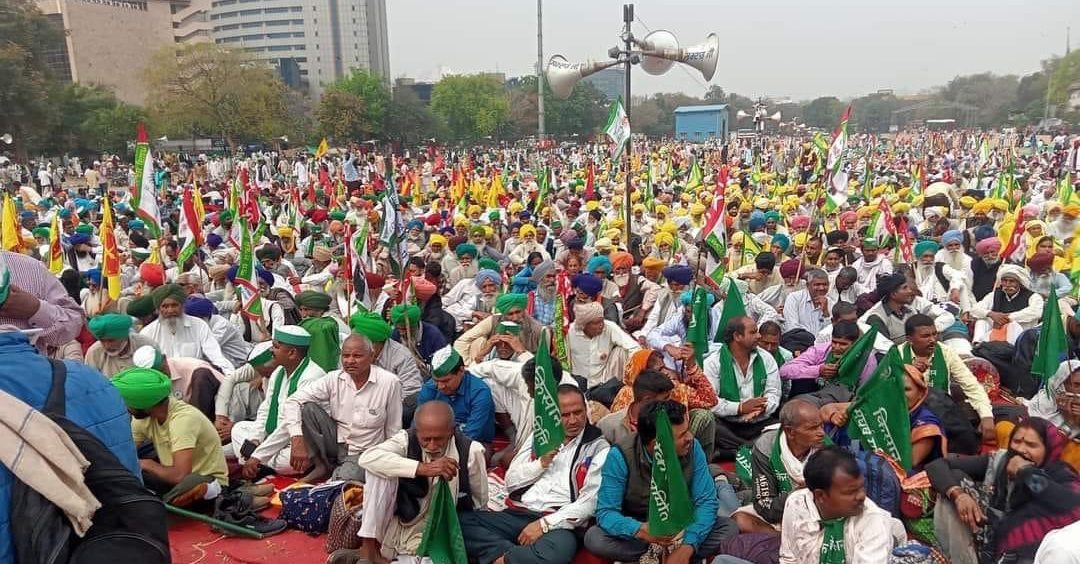
Mahapanchayat in
Delhi, March 19, 2023
Farmers from across India gathered in their thousands in Delhi on March 19 in a Mahapanchayat (mass meeting) to tell the ruling elite and their state that their struggles will continue for their demands, including a Minimum Support Price (MSP) -- a form of market intervention by the Government of India to protect agricultural producers against any sharp fall in farm prices.
Green, yellow, blue, red and many other coloured banners could be seen for miles as the farmers arrived in Delhi on their tractors. Shouts of Kisan Mazdoor Ekta (Farmer-Labourer Unity), Nasal Aur Fasal (For the next generation and our crops) could be heard across the streets and lanes near parliament. One of the speakers said that from Delhi they will go back to each village of India to organize and prepare for coming battles. "Hum yahan apni rozi-roti ke liye aaye hain. Apne bachhon ke liye, apne ghar, apni zameen ke liye (We are here for our livelihood, our children, our home, and our lands)," said Anita Devi at the protest in Delhi's Ramlila Ground.

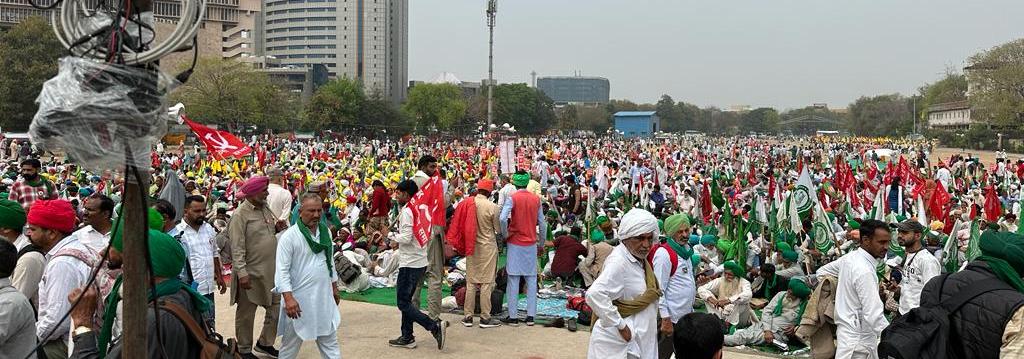 Delhi, March 19, 2023
Delhi, March 19, 2023
A leader of the coalition of farmers' union Samyukt Kisan Morcha (SKM) said, "There are several unresolved issues and these demand another 'andolan.' We will convene another meeting on April 30 in Delhi. I ask all farmers unions to hold rallies in their respective states and hold panchayats in the run-up to the meeting."
The ruling elite is imposing anarchy and violence in Punjab again to defeat the farmers' movement. A gangster in a prison has given a long interview about several murders. All officials implicated are denying any responsibility. A dramatic hunt is underway for a young man from Punjab. Rumors of his arrest or absconding are being flashed all over the media. Disinformation, deception and fraud are being imposed by the central government and media. His lawyer has filed a habeas corpus appeal in court. More than 100 youth have been arrested. Many people are being reminded of the '80s and '90s, when the army occupied Punjab and carried out genocide. But the farmers and people of Punjab will not be crushed and will carry on their struggles for renewal and renovation.
A Tribal Convention was held at Hamirparaa, Bhekadiya
recently.
About 800,000 Adivasi delegates from the four neighbouring states
attended namely, Maharashtra, Madhya Pradesh, Rajasthan and Gujarat.
Several important issues were discussed such as the culture of Adivasis
(Indigenous Peoples); the
need to develop societies where livelihoods, biodiversity and nature
are protected; the realization of the potential of the natural
resources to protect and sustain dignified livelihoods; local/village
governance (Gram Sabha) empowerment; tribal medicine and conservation
of medicinal plants;
awareness about the nutritional and health value of local foods; the
development of university education facilities for Adivasis; the
protection of forests from the spread of forest fires and the
destruction of the forests. The widespread destruction of major
forests has become a big problem because of the power of rich
farmers, ranchers, loggers and plantation corporations. In 2009,
India
ranked 10th worldwide in the amount of forest loss with
devastated environmental degradation. Annual deforestation is
estimated at 13.7 million hectares (3,604 acres).
People all across the Himalayas are also coming together to
save
the
Himalayas. People of Joshimath in Uttarakhand have been carrying
out
protests and Yatras (pilgrimages) against the
mindless
deforestation, urbanization, hydroelectric plants, railway
tunnels and
highways in slopes and along
the rivers all of which are causing massive erosion, sinking of land,
cave-ins, mudslides, devastation and destruction.
In Cambridge, Massachusetts, a vibrant symposium was held on
agriculture, nature dependent communities, climate change and
inequalities, to mark the 92nd anniversary of martyrdom of
Rajguru,
Sukhdev and Bhagat Singh. It was an all-day affair and
participants
engaged with concrete solutions to
pressing problems facing people in India and the world. One of
the
constant themes that kept coming through the presentations and
discussion was that people need to build sustainable and
scalable
mechanisms through which they can make decisions that affect
their
lives and nature. Many initiatives
that people have been taking in India were critically discussed.
The
entire day was spent discussing solutions, ending with dinner
and
cultural performances in the evening.
(Photos: tractr2twitr, Jubildas, K. Sandhu)
(To access articles individually click on the black headline.)
Website: www.cpcml.ca Email: editor@cpcml.ca


